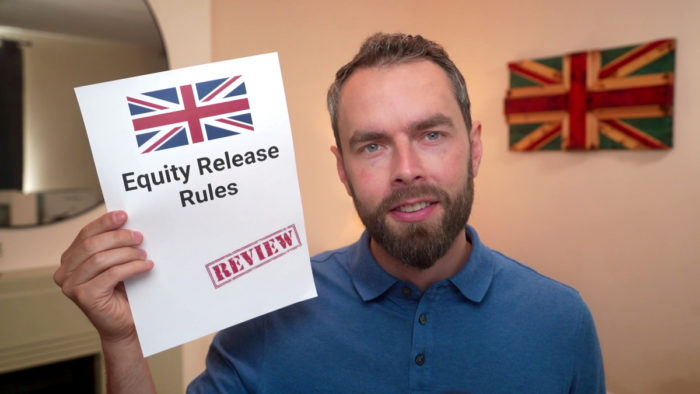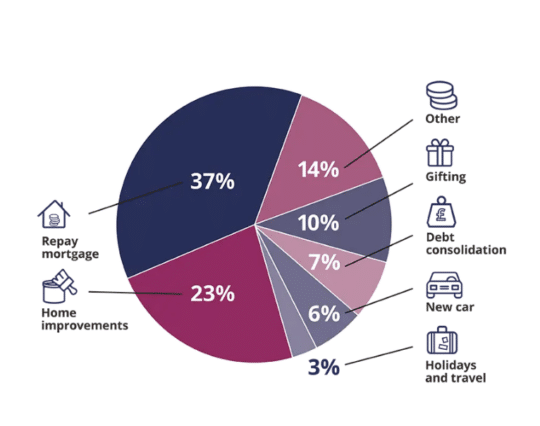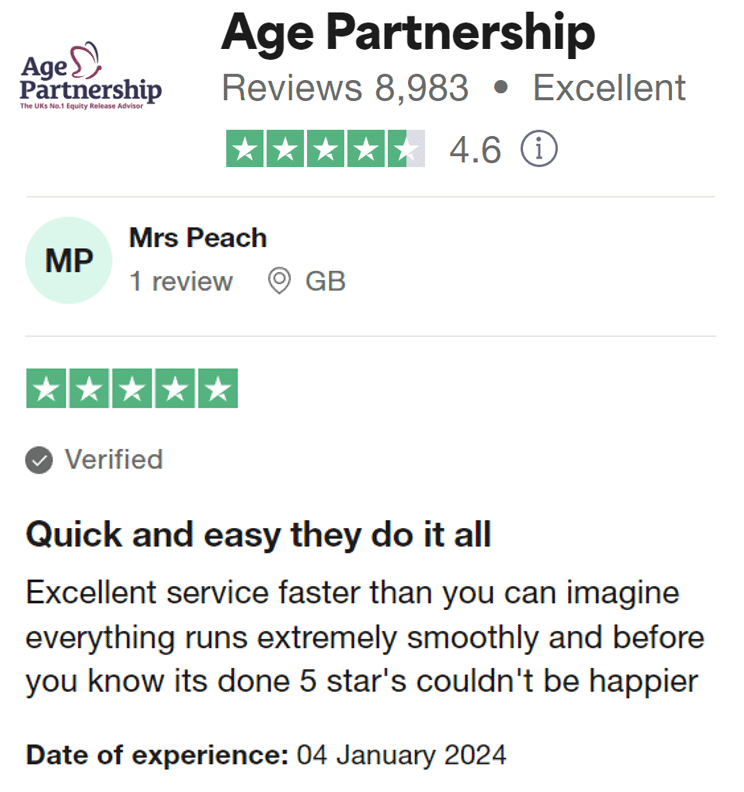Equity Release Rules – What You Need To Know
Our preferred equity release adviser is Age Partnership. For free and impartial money advice you can visit MoneyHelper.

Our preferred equity release adviser is Age Partnership. For free and impartial money advice you can visit MoneyHelper.
Are you curious about equity release rules in 2023? You’re not alone! We know that understanding equity release can be a bit tricky. It might even feel a bit scary.
But don’t worry, we’re here to help! In this article, we’ll explore:
- What equity release is and how it works in the UK
- The rules and eligibility for equity release
- The role of the Equity Release Council (ERC)
- How much equity you can release and how to get a realistic quote
- The benefits and potential pitfalls of equity release
Did you know? The Centre for Ageing Better’s study reveals that a million homes in the UK need changes to be better fit for living comfortably, and a third of these homes have someone over 55.1 This highlights the importance of considering equity release for those seeking improvements.
So, if you’re over 55 years old and have a home worth at least £75,000, read on! This article is here to help you understand the rules of equity release and if it’s the right option for you.
Let’s dive in.
How does it work in the UK?
There are two main types of equity release products in the UK, namely a home reversion scheme or a lifetime mortgage.
There are some slight variations of lifetime mortgages, such as an enhanced lifetime mortgage for people to access more money if they have a shorter life expectancy.
A Comparison
To make the right choice, it’s crucial to understand the main differences between a home reversion plan and a lifetime mortgage. That’s why I’ve put together this table that outlines essential considerations.
| Category | Home Reversion Plan | Lifetime Mortgage |
|---|---|---|
| Ownership of the Property | You will sell either a portion of or the whole value of the home and then be allowed to stay on the property as a tenant. The lender will become a co-owner. | When you take out the secured loan against the property, it will remain in your ownership until you pass/move into long-term care. |
| Change in Value of the Property | With a co-ownership, you will be directly impacted by the property’s value in current markets. This means that you could just as easily lose out on money in the case of a value decrease as you could benefit from an increase. | Since this loan is typically paid off by the sale of the property after passing/owner is moved into long-term care, the value of the home after this case may impact how much money will be left to the estate/family once it has been sold. |
| Inheritance | While some plans do offer a guaranteed inheritance amount, it is likely that the inheritance will be dramatically reduced because you’ve sold a large portion of the property. | Some lifetime mortgages allow for an inheritance protection scheme, but the overall inheritance amount is decided by the loan size and accrued interest. |
| Repayment | No repayment required during your lifetime. It will be paid back once the property is sold. | Some lifetime mortgages allow for partial, voluntary repayments during your lifetime. However, the majority of the loan will be paid back once the property is sold. |
| Type of Payment | There is a choice between a lump sum payment or a regular income with this loan. You can also choose a mixture of the two. | You can either receive a lump sum loan, or you can choose a drawdown facility which allows you to take out money whenever you need it. |
Our financial expert, Janine Marsh, says, ‘ A lifetime mortgage is definitely the most popular of the two options, especially considering the second option isn’t technically a loan (you won’t need to pay interest on it). Both types of equity release should be considered carefully as there is risk involved.’
What are the rules? (eligibility)
The exact eligibility rules for any equity release plans will be determined by the individual lender. As standard, you must be releasing equity from your main residence that meets a minimum valuation of around £75,000 and has no debts attached, such as a first charge mortgage.
Some may allow you to release equity with a small mortgage that you plan to pay off as part of the equity release process.
As an equity release plan is only available to seniors, there is also a minimum age requirement and certain documentation that you must provide during the process. Depending on the type of equity release plan and the lender chosen, you must be at least 55, 60 or 65 years old to use their equity release product. The older you are typically means you can get a lower interest rate.
How equity release could help
More than 2 million people have used Age Partnership to release equity since 2004.
How your money is up to you, but here’s what their customers do…
Find out how much equity you could release by clicking the button below.
In partnership with Age Partnership.
Do both parties have to be over 55?
When the minimum age requirement is set at 55 years old then this applies to both homeowners. If your equity release adviser suggests taking someone who is too young to qualify for equity release off the property ownership – be extremely cautious.
This can be really bad advice and open any younger surviving partner up to losing their home in later life.
Rules with the ERC
The equity release rules and guidelines created by the council have all been made to keep homeowners protected and provide them with greater reassurances when taking out a lifetime mortgage or other equity release product.
It’s highly recommended to only consider lifetime mortgages or home reversion plans from lenders that are ERC members. By doing so, you’ll benefit from an array of assurances, such as:
- The negative equity guarantee – as shown in our example earlier, lifetime mortgages can be expensive and easily double your debt in 10-15 years with a standard interest rate. You may be worried that if you live for a long time that the amount you owe will be greater than the value of your home and what it will sell for. The negative equity guarantee means that you never have to pay any outstanding debt beyond the sale proceeds, which could leave more money in your estate for your loved ones.
- You’re free to move – With an ERC member, you are allowed to move to a suitable alternative property and take your lifetime mortgage to the new property. A suitable alternative is another property that will be just as easy to sell in the open market and of similar or higher value.
- You’ll never be forced out of your home – ERC members must guarantee anyone that takes out a lifetime mortgage that they will not force them out of the property or repossess it in any normal circumstances. The only time this may not apply is if you have committed fraud on your application or are purposefully damaging the property.
» TAKE ACTION NOW: Fill out the short debt form
What are the rules on spending the money?
There are no restrictions on how you can spend your lump sum or drawdown money. Most people spend the money on making their retirement better, which may just be easing the financial burden of everyday expenses, renovating a home so it is more elderly-friendly, or going on more holidays each year.
Some homeowners decide to invest the money in a new property, such as a rental investment or holiday home. If you decide to buy a holiday home, there can be some complications and things to note.
Lifetime mortgage debts can be recovered if the homeowner is no longer living at the property, hence why it becomes due if you move into a residential care home.
If you buy a second home and live in it for too long each year, you could be judged to have changed your residential address and therefore owe the money back immediately. The specifics of these rules will be determined by your lifetime mortgage provider.
Join thousands of others who release equity
Age Partnership have helped over 2 million people release equity from their home.

Mrs Wareham
“I am more than pleased to have taken out Equity Release with Age Partnership.”
Reviews shown are for Age Partnership. Search powered by Age Partnership.
How much can you take out?
The amount of home equity you can release will depend on the lender’s maximum loan-to-value ratio, your age and factors related to your property. There could be a minimum loan amount you have to take out, subject to the lender’s own equity release rules.
On average the most amount of equity you can release using lifetime mortgages is around 60%, while you may be able to access a little more with a home reversion plan.
If you have a shorter life expectancy than expected, possibly because you have been diagnosed with a terminal illness, you might be able to access more home equity than standard.
This is known as using an enhanced equity release scheme where your health is assessed through a questionnaire and proven by supplying the lender with your medical records. No additional medicals should be required as part of the application process.
Getting access to more money during this time could be used to fund private care and treatment or to tick off the things you want to see and do before you die.
It’s also worth noting that the value of your property will affect the amount of equity you can release, especially how property appreciation or depreciation over time can affect the total amount you owe.
The location of your property may affect your ability to lend
This is often overlooked by people looking into equity release, but the location of your property may affect the amount you can borrow. For example, if you live in England, Wales or Scotland you have access to all plans, but if you’re in Northern Ireland, you have less access to lenders.
Not only that, lenders also look at where your property is, and what might affect its resale value, for example, if you live near a noisy railway.
Do you have to get financial advice first?
ERC members are told to ensure that potential borrowers have received advice before they get equity release. However, you should opt for independent financial advice rather than just using the advice given by a company offering lifetime mortgages.
How about independent legal advice?
Yes, as part of the equity release process, you are also required to get independent legal advice too. Most people can get independent legal advice from the same company they receive financial advice from, such as equity release specialist companies. They’ll also help you search for lifetime mortgages in the UK and compare options.
Can you do it with bad credit history?
Even though you are not required to make monthly repayments after you get equity release, the lender will still complete a credit check to see if you have existing debts.
If you have CCJs or a charging order, you are likely to be rejected for your equity release plan, unless the lender is able to use some of the money to clear your debts directly. If you have a bad credit history but have already paid back all arrears, there is no reason why you will not be able to get equity release.
Can you be rejected?
You can be rejected for equity release if you have CCJs on your credit file, but there are more common reasons why people get rejected for a lifetime mortgage.
You are more likely to get rejected for equity release if there are issues with the property. The most common reason is too great a percentage of the roof is flat, but other reasons include:
- The presence of asbestos
- Non-standard construction, possibly not built to regulations
- Single skin constructions
- Proximity to a commercial property
- High flood risks
The benefits of taking out a plan
Here are some of the reasons why seniors still consider taking out an equity release plan:
- The money can be given as a lump sum or drawdown
- It can be spent without restriction or even given away
- You do not need to make monthly payments, but you can volunteer to pay some of the interest off to keep the debt total lower
- You continue living in your home without having to pay rent and without the threat of being evicted in normal situations.
- As illustrated earlier, the ERC provides a tonne of additional benefits and assurances.
What are the pitfalls?
Before rushing into an equity release agreement, it’s essential that readers are aware of some potential pitfalls, such as:
- Releasing too much equity – releasing too much can significantly increase your total debt and can be avoided. If you are not sure how much you need to borrow for your purpose, consider a drawdown facility instead to avoid unnecessary over-borrowing.
- Disclose all information with financial advisers – make sure to tell everything to your adviser so they source the best equity release loan for your circumstances. For example, downsizing in the future can mean paying back some of your loan and incurring early repayment charges. But knowing this in advance could mean getting an agreement that doesn’t incur costly fees when you downsize.
- Not using an ERC member – although it is not mandatory, using an ERC member to get your loan can be highly beneficial, and it is almost a mistake not to use these companies in many situations.
Is it the right option for you?
Equity release is more than a financial decision, it is a personal decision that considers your estate and who will inherit your wealth and assets. Speaking with an independent financial adviser is the best and only way of knowing if it is the right decision for you. They will not tell you what to do, but they will give you the facts so you can make an informed decision.
Does it get taxed?
Equity release doesn’t feel like a loan because the money is not paid back through monthly repayments. But it’s important to remember that it is a loan, and because it is a loan, the money is not subject to income tax or Capital Gains Tax. You will not have to pay tax on any of the money you receive.
But there can be consequences to the inheritance tax owed on your estate. By not passing on a complete property to a child or grandchild, you miss out on increasing your inheritance tax threshold by £150,000.
On the flip side, by gifting the money from equity release away, that money will not be subject to inheritance tax at all as long as you remain alive for seven years from the date the money is given away.
Does the scheme affect your state pension?
I should clarify that equity release doesn’t impact your state pension, which is a standard amount for everyone. However, it could affect your Pension Credit if you’re a low-income earner, as it’s means-tested.
Equity release does not affect eligibility to receive a state pension because it is not a means-tested benefit. Only means-tested benefits can be affected if your cash wealth increases, i.e. if you now have a lot of savings you may not be allowed to receive state support.
Some people receive a pension top-up payment called pension credits. For every £500 they have in the bank above £10,000, they receive £1 less in pension credits.
Having too much saved can wipe out any eligibility to receive pension credits. This is significant because, without eligibility for pension credits, you can more easily lose eligibility to others, such as a council tax reduction.
An alternative option
If you want to leave the full value of your property as an inheritance for your family then using an equity release plan won’t be suitable. There is one good alternative that allows you to create a financial nest egg for retirement financial planning, while also leaving a complete property and its market value to family members.
The answer is to downsize.
By selling your home and moving into a less valuable home, you could create a financial pot and then still own 100% of a property that could be passed on, and it may have increased in value further when it is passed on.
Some negatives of doing this are the stress and costs involved when moving house, especially in older age. Or you and the rest of the family may have a sentimental attachment to your current home and not want to sell.


